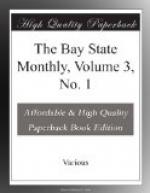This agitation finally culminated in diplomatic correspondence between the representatives of Great Britain and the United States relative to the construction of such a means of communication and the rights of the two nations to the same, resulting in the treaty. In April, 1850, the Senate of the United States, by a very large vote, ratified and confirmed this treaty, notwithstanding it was vigorously opposed by such men as Stephen A. Douglas and Lewis Cass, then in the zenith of their fame.
It appears in the Congressional record of 1850, and subsequently, that the treaty was ratified without a very clear understanding of its meaning; and it was even hinted, in rather plain language, that the representative of Great Britain had been too sharp, too diplomatic for his American brother, and had overreached him. It further appeared that the honorable Senate was sadly deficient in knowledge of geography, and national boundaries; for it is matter of record, that many Senators voted for the ratification under the impression that British Honduras was included in the territory of Guatamala, and that the British settlements were in that republic; while, as a fact, Balize or British Honduras was on the easterly side of the Isthmus, never had been a part of that republic, and the British settlements were, and always had been, in Yucatan. They further understood the treaty to say, that neither government should occupy, fortify, or colonize Nicaragua, Costa Rica, the Mosquito Coast, or any part of Central America; but it is a fact, that at the very date of the treaty, at the date of the ratification, and since, Great Britain occupied and colonized the Mosquito coast, or that part which joins British Honduras on the northerly side of South Honduras; and Mr. Douglas, in 1857, in a debate in Congress upon a “resolution of inquiry as to the present status of the treaty,” said: “I voted against the treaty, Mr. President, for the reason that I am unwilling to enter into any stipulations with any European power, that we would not do on this continent whatever we might think it our duty to do, whenever a case should arise. I voted against it because by clause 1 of that treaty we are debarred from doing what it might be our duty to do; but as it has been entered into, I desire to see it enforced. I am not yet aware that that clause of the treaty has been carried into effect. I have yet to learn that the British Government have withdrawn their protectorate from the Mosquito Coast; I have yet to learn that they have abandoned the possession of that territory which they held under the Mosquito King.”




